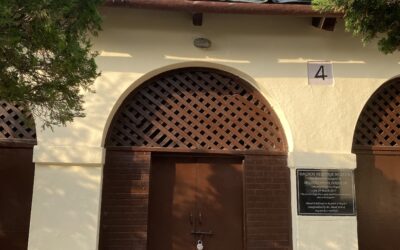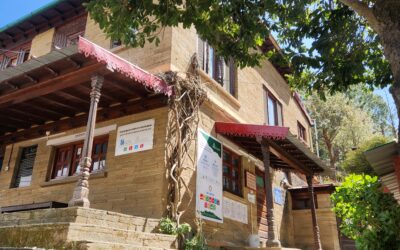“I measure the progress of a community by the degree of progress which women have achieved.”
– Dr. Bhim Rao Ambedkar
This blog is based on a telephonic interview of Kanku Ben taken by me. However, the whole conversation was in Hindi which has been translated, not word to word. The theme/essence remains the same. The interviewee was made aware about the edits and she agreed to publish it this way. I am also aware of the rights of the author/writer and the extent of creative liberty, yet still went through moral dilemma while making the changes. This needed to be shared.
Introduction
Kanku Ben Amritlal Vankar (will be referred as Kanku Ben here on) is the Sarpanch of Juth (Group) Gram Panchayat that consists of four villages – Kukma, Nani Reladi, Moti Reladi and Lear, here in Bhuj. She is an award winning artisan with a long interesting journey full of hard work and dedication that led her to reach where she has reached. In 2011, the then President of India (Shri Pranab Mukherjee) honoured her with a National Award for her unique design in Toran Art at Vigyan Bhawan, Delhi. There is this concept of model Gram Panchayat but there is nothing called a model Sarpanch. In fact, the idea itself came to me after being part of various meetings and activities with her. It is not easy to be a Sarpanch, specially not for a woman who belongs to a Scheduled Caste. Such layered are the complications and boundaries of Kanku Ben’s journey!

I decided to know more about her and document it. The conversation went on for two hours and can be broadly categorized into:
- Personal Journey
- Empowering Other Women
- Vision, Achievements and Challenges
Personal Journey
Faraz: How has been your journey so far? Please share your memorable life experiences.
Kanku Ben: I come from a family where education, specially girl’s education was the least important thing. One big reason for that was the financial situation of the family. Secondly, the school in our village was until class 7. So if someone wanted to study further, she/he had to travel a long distance. In those days, there was nothing like a free bus pass for girls or any such provisions. It was an expensive deal. Thus, I studied till 7th and dropped the idea of going to school any further. Subsequently, I started working with my parents, who were artisans. I was a good student, getting either 1st or 2nd division in school till I was there. It made me decide that I will become something (didn’t know what) and will not let at least my children go through this.
Faraz: What inspired you to become a Sarpanch? How did it happen?
Kanku Ben: Never even in my wildest dreams I or my family could think that I would become a Sarpanch. I was fortunate that this seat was reserved for someone from Scheduled Caste for the first time and I belong to the category. Had that not been the case, it wouldn’t be possible. Also, I was an active member of the panchayat and used to volunteer for various social welfare programmes. Additionally, through my shop, I was also helping women to get handloom work. It was more a demand that came from people, of me contesting for the post of Sarpanch than me choosing it.

Faraz: Did you face any discrimination because of being a woman or otherwise? This could be from before or after becoming a Sarpanch.
Kanku Ben: We are a patriarchal society, I think since time immemorial. It applies to all category of women at different levels. Strangely, earlier I did not feel bad or pained that I am being discriminated. Many girls/women in the village see it as their fate or way of life. But now it hurts me more as I am working with various social organisations where I get to meet many people and know how women are being treated. Awareness is also important to identify it. Now we have Mahila Sabha, various committees where issues are raised to a large extent. Even a woman Sarpanch has to work at home and at office or in field. It is expected from her to complete the household work irrespective of her position and other responsibilities.
Faraz: You are a National Award winner artisan. Please tell me about your skills and experience as an artisan.
Kanku Ben: This has been our profession since a long time. My parents did the same work. In fact, my in-laws (both father in-law and mother in law) and my husband are also award winner artisans. I used to create my own designs for competitions that used to happen in Bhujodi (a few kilometres from Kukma village). Then I decided to create a masterpiece. It took me eleven months to create this design called Toran. It consisted of twenty two natural colours, all from vegetable and oils. The hard work paid off and got recognised by the then President of India (Shri Pranab Mukherjee) in 2011.
Empowering Women
Faraz: What is women empowerment to you?
Kanku Ben: Empowerment may mean different things to different people depending upon the economic and socio-political conditioning in which one lives. Earlier, it may have meant something different to me but now, probably the understanding is more evolved, given the fact that my position has given me some kind of a privilege. Women empowerment is basically a step forward, a better stage whether it is economic, social or political; that puts a woman ahead of her earlier stage. It can be achieved through various medium such as education, decision making power and awareness. For example, I made sure that my daughter would go out of the village to complete her school and also sent her out of Bhuj to complete her higher studies. This was not a unanimous decision in the family but I was determined and it happened.
Faraz: How did you get the idea of naming a street on the name of the girl who topped the village school? Why did you feel the need for women’s park?
Kanku Ben: It was on my mind that something like this should be done to encourage the girls of our village. In 2018, a special Gram Sabha was called to discuss specific agendas which otherwise, are left out. There again, a similar idea emerged. It was noted down and legally formulated. If we talk about the decentralisation of powers which should flow from bottom to top, it should also be reflected at the local level.
Why should every street, road and building be named after Rajas and politicians why not the local people of the village. The result is highly positive. Now the girls feel encouraged and proud.
Many times, they ask me if they can contribute in any way possible. They volunteer to encourage more people. Recently, a suggestion was sent by women’s commission in favour of the steps to encourage girls towards naming streets on their names. It feels great that different departments are thinking of something that’s already being done in our villages.



As far as women’s park is concerned, it was a vacant land where people would throw their garbage. It had gone really polluted causing illnesses and rise in dengue cases. It was also harmful for our environment. Some people wanted to occupy the land. So we decided to take action. After taking permission from the government and following the legal procedure, we took that land under Panchayat. January 3rd was approaching which is the birth anniversary of Savitri Bai Phule. So we named it after her. Many people asked who is she. I felt that it was the right time to make people aware of her contribution in women empowerment. A session was conducted to talk about Savitri Bai Phule. Now this has become a landmark. People living nearby identify themselves as the residents of women’s park area.

Vision, Achievements and Challenges
Faraz: Please tell me more about your vision, achievements and challenges, if any.
Kanku Ben:
Vision – It is the same as that of Baba Bhim Rao Ambedkar. In fact, now we can talk about rights and livelihoods because he worked hard to provide us with the platform, the vision document i.e. The Constitution of India. Sometimes I think of his struggles and dedication, and tears wouldn’t stop rolling down my eyes. I wish to bring people together, where all the communities are represented equally. Education is important to me. I want to ensure that no one is left behind because of reasons that could be addressed by the Panchayat and other government departments.
Achievements – We have worked hard and achieved various milestones. Our idea of achievement or development is not limited to infrastructure. We look into the social issues as well. Education should be a right to all and not a privilege. When we visited private schools, we saw that the students are taught to operate computers whereas the government schools were still teaching traditional subjects. We contacted a few companies for CSR (Corporate Social Responsibility) funds and got 13 computers for the government school. There is no provision for a computer teacher in public schools. We appointed one from our village, a computer engineer whose salary goes from Panchayat’s fund.

Computer class 
Dear God, if you are listening…
The aanganwadi is mandated by the government but that does not suffice. Maintenance and proper check-ups are done by Panchayat members and we have made sure that it runs smoothly. We had organized a program called Widhwa Sahay, specifically for widows of our Gram Panchayat. More than 150 women participated in it. We supported the program both financially and socially. While we conducted different activities together, we also filled widow pension forms. More than 60 people benefited from it. We had also organised a meeting with all the Pramukhs (leaders of every community) to discuss social issues and how to tackle the ill practices that are being followed since ages such as early child marriage. All Pramukhs took an oath to work towards eradicating such practices and not follow it themselves.

Widhwa Sahay 
Pramukhs
GPDP (Gram Panchayat Development Plan) is another successful program where our village actively participated and prepared a detailed village plan.
Challenges – There have been quite a few social and administrative challenges. GPDP is a good process, also been followed by our panchayat. However, it sometimes does not get implemented by government officials. Talathi (Secretary) of our panchayat gets transferred frequently. It becomes a hurdle in maintaining records, and also makes it difficult to coordinate between Talathi and Panchayat members. Social change, on the other hand, is a long continuous process. People do understand and improve their practices if it is communicated properly, at a personal level. Any social change is possible only from within the society. Therefore, people of the village should always be the driving force.
Before you are a leader, success is all about growing yourself. When you become a leader, success is all about growing others.
Jack Welch












0 Comments